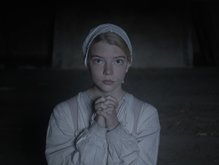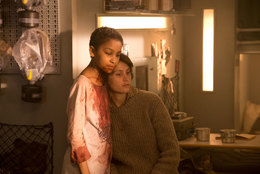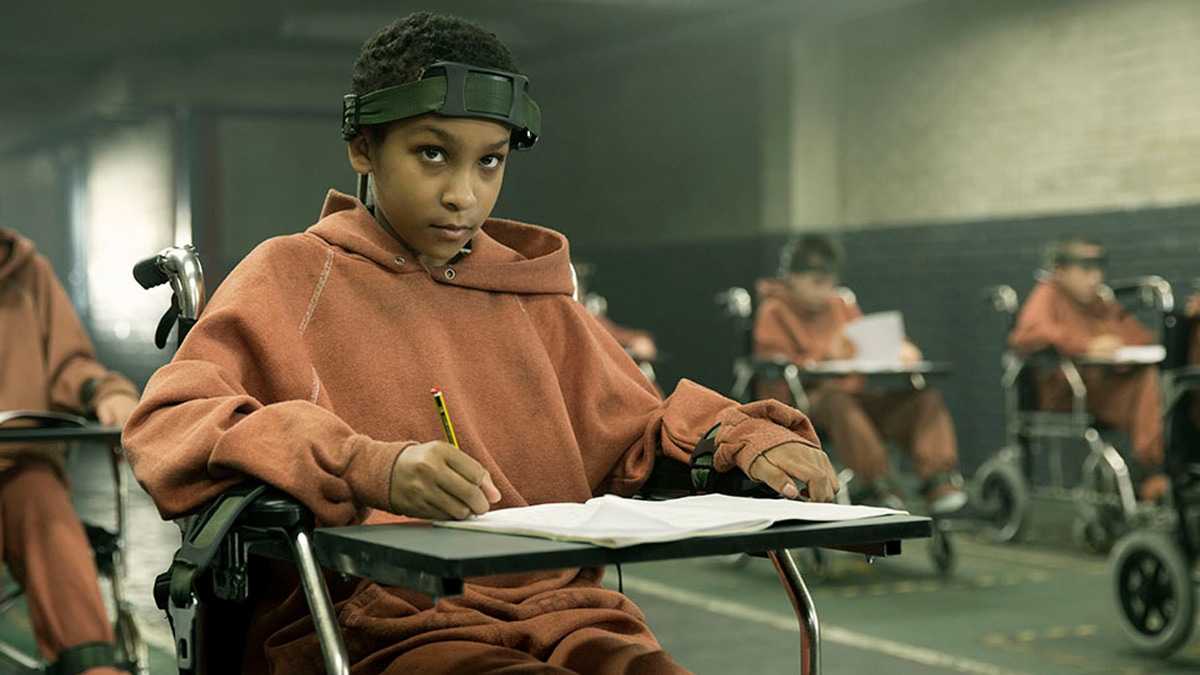|
Mad Max: Fury Road and Apocalypto are two awesome movies. Strangely connected by Mel Gibson. He was the original Mad Max and then he directed Apocalypto. One great feature of both movies is the idea of chase, and flight. In both cases, just about half the movie is chasing/fleeing at high speed. In Apocalypto, the chase is on foot through a jungle, in Mad Max it is with vehicles through a post-apocalyptic wilderness. Both feature religion in fascinating ways. In Apocalypto you get the full force of the Inca religion and then it runs smack into Catholicism, literally. There's a great scene at the end. Here it is. (Stop at the 1:35 mark or go on to the end) In Mad Max, they mix in different religious elements including, Valhalla, the Nordic after life. When the War Boys are about to die, they call out to the others, "Witness Me," and then then go out in a blaze of glory. We get the first taste of this in this following scene. In the film, one of the War Boys is captured by Furiosa and Max who are fleeing their captors. Nux is spared and he joins them and one of the women with him takes to him. The plan is, along with the few others with them, to destroy the sole path through a natural stone arch and return the community and run it differently. But of course, things go wrong and it is clear that Nux is going to die. And so in that moment, in an absolutely fantastic scene, he calls out to the others to witness him. When we think of death, there are two poles. On the one hand, we die alone. No one dies or can die with you or for you. That is the stark reality. On the other hand, we want people to share that death. But only if they want to. So only in a moment, when you are witnessed in death, is the cycle complete in a sense. Just as we're never born alone, when your death is witnessed, you don't die alone.
1 Comment
A poignant scene in The Chronicles of Riddick (one of the most awesomest films ever) has to do with the forced conversion of the people on Helion Prime. This is the scene (an extended scene with footage not seen in the film). "We all began as something else." The Purifier says. Those words always stuck with me because it sounds like this is the human story of religion and culture. We all began as something else. So, is the statement an argument in favor of conservatism or progressivism? Should we fight to conserve and thus resist the command to shed the past so easily, or should we be willing to accept that our anchor is in the future and what we were is not what we are destined to be?
I love the fact that the Purifier answers this later in the film. Here's my blog on his atonement. I recently did what I have never done before. I returned a Netflix movie before I was done watching it. What movie is this? You might ask. The Dying of the Light with Nicolas Cage. Well, you might say, this is not quality entertainment, and I would reply, I love movies and never said anything about "quality." So why did I give up? One--lack of time. Two--I vas seriously bored and unentertained Why? Because I knew how the movie was going to end. Huh? Why does that matter? You ask. We all know how movies are going to end. This is true, which is why I needed to figure this out. Let's view the trailer first. There you have it. I have to say that I'm a proud Nicolas Cage fan. Apparently among actors, he is regarded very highly (according to Wikipedia). So I am in good company. Broad story--Nic Cage is a CIA guy who was tortured by a terrorist. The terrorist is presumed dead but Cage believes he is still alive. The terrorist guy, though, had a rare disease and is ailing and will soon die if he is still alive. Nic Cage (I know--his character) is also ailing from a mental disease caused by repeated trauma to the head--the torture session earlier. So you have these two old foes, who nature is killing, but Cage is bent on making sure nature does not subvert justice. So I think the unique angle here is that we don't have the sexy Tom Cruise mission impossible guy who is uber capable, but we have an ailing man who is deteriorating before our very eyes. We see the symptoms play out as the movie develops. So, over the course of three days, I labored, 20 minutes at a time, to watch this film. Finally, I said, this is not going to happen. I had seen enough. I knew how it would end. With the help of his friends (one played by the remarkable Late Anton Yelchin) he would find this terrorist. There'd be some sort of confrontation and they both die but he gets the satisfaction of meting out justice. (I don't even have time to read the Wiki entry--that's valuable sandwich time.) My question for me is, do I not want to see someone deteriorate before my very eyes? I don't know. Seeing all his "moments" was getting very old and I just could not bear forty more minutes of him losing his temper, or forgetting where he was, or mixing words, etc. Could this be my inability to address human frailty and come to grips with the existential fact of my demise? That could be it, except that one of my favorite movies (besides The Chronicles of Riddick) is Wit. Here's the trailer for Wit ( I couldn't find a real good one so I went for this. The other ones I found were essentially five minute summaries of the entire movie!) Wit shows the progression of a devastating ovarian cancer on an English professor. She breaks the fourth wall and so we get these very funny, witty, and brilliant insights into the process. it does get heavy at the end and the viewer is not spared anything. You watch her deteriorate before your eyes and it is painful and hard to watch. From the start of Wit, it is clear that this will not be a happy ending, that we will not be spared the gruesomeness of being a "patient" of this sort, with all its attendant indignity. We know how it ends.
So why would I like this and not Nic Cages' film? Wit is a mirror and Dying of the Light is a blurry facsimile of the human end. Wit engages because it reflects possible truth. Dying of the Light is tedious because there's no real payoff at the end. You don't learn anything at the end (I know. I haven't seen the end. . . . I have a right to my opinion, so back off!) With Dying of the Light you learn . . . (haven't seen the end so I don't know what you learn). With Wit you learn about the inherent indignity of being a patient. You learn about the perspective of the patient. You learn about what becomes important the closer you are to death. One irony, as the English professor wastes away, she wants less of John Dunn's poetry, a difficult metaphysical poet, and wants more simplicity and wants to express herself in the most basic of terms. On the other hand, the film features a young resident who is a researcher and uninterested in clinical work. He was a former student of hers which creates an interesting and funny dynamic. But towards the end, her poetry class seems to have provided him the best paradigm for his work and you see the work of the Humanities cheating through and reframing his perspective. That's payoff. So in the words of Dylan Thomas "Do not go gentle into that good night, Old age should burn and rave at close of day; Rage, rage against the dying of the light." Arrival, as advertised, is an intelligent first contact sci fi movie. I loved it until the end. They had me at hello and then it said goodbye and I was left very underwhelmed. The film is an account a linguist, Louise Banks, contracted by the government to help communicate with aliens who have arrived in 12 different semi-ovoid ships. Each one in a different area around the world. She helps develop a way to understand their language but is under pressure by the military to answer the big question, "why are you here?" Part of the pressure comes from the fact that China and Russia, to some degree, have adopted a belligerent stance toward the aliens. Which means that an attack on one of the alien ships is a declaration of war between the aliens and humanity. On a personal level, Louise is having "memories" about her daughter who died of an incurable disease and the fact that her husband left her because of their daughter's illness. We later find out that these are not memories but visions and that her husband is the physicist who she works with on this alien project. And I think the big lesson here is that even knowing the future pain, she choosing to marry him. So, what's my issue? I was very much into her personal story as defining who she is and it looked like she was searching her mind for clues to crack the alien linguistic, cultural and behavioral code. I really loved the sci fi with the linguistics lessons and the political layer was a good touch. The problem was that it never all came together for me. The aliens reveal that language is a powerful weapon that will save us? I think that was it. And they gave us the glossary or text book for their language which captures their unique sense of time. That is such a let down. We already know this from Harry Potter! Words are powerful. Further still, we know this from Doctor Who, that words are powerful because they are timeless--the episode in which Shakespeare crafts the perfect words to expel and an evil force from the world. So back to Arrival. Just when the movie called for a very interesting spin on the power of language, they pack up and depart!
Then, to make matters worse, the film pivots exclusively to her realization that her visions of a child and husband are her future with the physicist guy. There is no resolution of anything for me. We don't see how language is powerful nor do we see how her personal story is an analogy or metaphor of the larger issue. So here's my brilliant Director hat going on. First, go with a different approach in the music. I was very underwhelmed by the music the first time she saw the ships from the helicopter. The music went downhill for me from there. Next. Dr. Banks has this convenient ability of being the special person who can dream the future. She happens to call the Chinese General's cell phone at the very last second and repeat his wife's words to him which leads to China standing down. 18 months later, we get world unity. Rather, have China open fire at the ships, which triggers the same reaction from everyone else, so that they damage the alien ships. Then have ships list and appear defunct but clearly somewhat functional. and the aliens likely alive. At this point, Dr. Banks can lead a worldwide movement to recognize the power of our words and the gift of the alien language as well as the gift of a new perception of time. This perception of time, being non linear, means that you can restore the ships to perfect health and this restoration would be done using the power of words--we all sing kumbaya or something. So picture all humans singing and these ships reconstructing themselves off the power of the human song. Then in an twist, the aliens still want to continue meeting with us knowing that our attack on them is a fixture of time and cannot be evaded since time is non-linear. Thus, the past will always occur. Here, then, you can get the same lesson Louise teaches us--chose the beauty of the moment of over the fear of future pain because it is the present that matters. Arrival--it's strengths are the beginning, great acting from Amy Adams, loved the linguistics, loved the bigness of the moment, loved the squid-like aliens, loved Forest Whitaker . . . did not love the end, was not impressed by the music, too much teasing and not enough fulfilling. All in all, definitely a must watch.  "Wouldst thou like the taste of butter . . . wouldst thou like to live deliciously?" This is the climactic scene in the film The Witch (2015) where the eldest daughter of the pilgrim outcast family. Tomasin, demands Black Philip, a goat--also an incarnation of the devil (?), speak to her. All movie long, her younger siblings had claimed that Black Philip speaks to them and told them that Tomasin was the witch, which of course, she wasn't. On the contrary, she seemed to be the sweetest and most grounded of all them all. So embrace of the devil is unexpected and disturbing. The sequence of the interaction is interesting. The devil never initiates or coerces. At each point, the choice is hers. She follows Black Philip into the barn. She "conjures" him to speak to her. He asks what she wants, to which she replies, "What dost thou offer?" Now, here is where Satan makes his pitch. Of all the things that could be offered, of all the things that the mighty Lucifer could present, the first thing he says, "Wouldst thou like the taste of butter?" Fascinating writing. He goes for a very simple sensation, butter, and then extends the offer to a delicious life. One thing missing here is the offer of power. In two biblical scenes, Eve and Jesus' temptation, Jesus is tempted through food. Probably something like "Wouldst thou like the taste of hot, warm, chewy bread?" When Jesus declines the hot, warm, chewy bread, Satan ramps it up and eventually offers power, the kingdoms of this world. In Eve's case, the fruit appealed to the eye and looked good to eat. But the clincher it seems was that it "was desired to make one wise," or be like God--clear offer of power. What was different in the biblical scenes and in The Witch? Many things, but with Eve and Christ, both had a lot to lose. Warm, chewy bread was just not enough to give up obedience to God. For Eve, she had everything she wanted in the Garden of Eden. But Eve and Tomasin are seduced by Satan because in both cases, he offers what is seemingly otherwise unattainable. Tomasin had no where else to go and the offer of a delicious life was far more generous than she could have hoped for. Eve and Adam are an interesting case. They could have been content, but the very presence of God on a daily basis only serve to reveal to them what they were not, regardless of what they did possess. The simplicity of the temptation, butter or a delicious apple, was really a complex symbol representing power, the power to attain the unattainable. With Satan, it's never just butter.  The Girl with all the Gifts is an atypical zombie apocalpyse set 10 years after the fall of human civilization to a zombifying fungus that wraps itself around the human brain. We are introduced to a seriously cute young girl, Melanie who is part of a cohort of children in a subterranean bunker. What strikes you immediately is the fear and care with which the soldiers treat these children. They are transported by teams of two soldiers, one of whom has his or her gun pointed squarely at the child. These children are second generation zombies, who contracted the infection in utero and ate their way out of the womb. Without a human-scent blocking ointment, these seemingly innocent kids, triggered by the human scent, turn to insatiable zombies. A young woman, Helen is the children's favorite teacher and Melanie is her favorite student. Above ground, the base is surrounded by mindless zombies who claw incessantly at the fence. The zombies finally break through just as a Dr. Caldwell is looking to synthesize Melanie's spinal fluid to create a possible vaccine. In the chaos, Melanie and Helen save each other's lives and in turn are saved by the base commander in a truck and Dr. Caldwell and three other soldiers. They escape the overrun base with the aim of getting to the main base in London. Along the way, the lose a couple of soldiers but eventually arrive in London and find a medical mobile unit in which they can survive indefinitely. They also then realize that the fungus causes the zombies to sprout and produce pods which when opened will spread the infection and no one would be safe any longer. In the London wasteland, we discover other kids similar to Melanie who lure a soldier away to kill him. The group goes out to find him but it is too late. A dying Dr. Caldwell, tries to incapacitate the group upon their return and attempts to create her vaccine but Melanie is too smart for her and prevents her. Melanie then sets fire to the vine outgrowths with the pods which release the spores into the atmosphere and solidify the fungus' domination over the earth. With everyone dead except Helen, she is stuck in the mobile unit for life, Melanie then rounds up the wild kids and other kids from the base and a distraught Helen continues teaching them from inside the mobile unit. I found the film to be a nice British take on a zombie apocalypse. I tried to compare it with I am Legend. I am Legend is typically American--everything builds up to a climactic scene and we are left with hope, uncertain hope, but still hope. The Girl with all the Gifts is more philosophical in its orientation. First, is the issue of anthropocentrism. Does the earth belong to humans? Are we the point of all existence? This film makes the point, no. We are simply a moment of earth's history and without right of perpetual dominance. At the end of the film, it is the time of the fungus. There is hope to be sure in that you have a whole community of kids who are human-fungus symbiotes and presumably will establish a human community immune to further infection. But humanity as such is done. The other striking thing is the irony of the reversal. The children were the one's in restraints at the start and the teacher was the free one. At the end, Helen is restrained for life, while the children are free. I really liked the film. I liked it grittiness. It's gory. A ton of convenient things happen to move the plot along but c'est la vie. It's very well acted. "I have done unbelievable things in the name of a faith that was never my own." This is the most powerful scene of the film for me.
The purifier is caught between his original identity and his faith, which is an assumed identity. No one is born a Necromonger, everyone is a forced convert, but a convert nonetheless, in the true sense. They are converted to belief in the Underverse. There is no sense we get in the film that the adherents were anything less than faithful to their faith. But something happens to this purifier and he is burdened by all the atrocities he has committed in the name of his assumed faith. And, in a bid for redemption (as I see it), he allows Riddick the opportunity to kill the Lord Marshall and commits suicide by walking out into the atmosphere of the planet to atone for all the terrible things he has done. So what is a "faith that was never my own"? Is it that he wasn't born into it? Perhaps, but I see it differently. Conversion is the end process of education. After we encounter a new set of ideas or facts about existence, we make choices about the degree to which we adopt these ideas. However, whatever you choose to believe has to be continuous with what you already believe. When a convert hears a message, she recognizes something in that message that resonates and then adopts it because it makes sense at some level. If something makes sense then you can think of it as a lego piece being added to a structure already created. Thus, if someone claims conversion, but the new propositions are not co-extensive with his prior set of beliefs, the dissonance will eventually manifest itself and the conversion or lack of it, is exposed/revealed. True conversion is a process of building continuity. So the purifier has come to terms with his inability to juxtapose his faith in the Underverse, the eschatological hope of the Necros, and his need to for self-justification. In the end, the Underverse is not worth the dissonance. The desire for self-peace or wholeness ultimately wins out. Not exactly highbrow here, but this scene is what caught my attention and made the Chronicles of Roddick one of my favorite movies of all time. The scene is so bad and cheesy and I thought to myself, there has to be art to it and I was determined to find that art . . . and I did. The movie is a great study in the nature of religion and I want to explore that over the next few months. But in the meantime, this scene requires that you check your intellect at the door and enjoy the pure artistry. It's elusive and only the initiated may see the truth of it. Are you worthy? |
AuthorOno Ekeh Archives
June 2020
Categories
All
|


 RSS Feed
RSS Feed

